Second Consultation Period 30 September – 30 October: Please Give your Feedback
The High Carbon Stock (HCS) Approach Steering Group would like invites any interested parties and relevant stakeholders to contribute to the HCS Approach Methodology & Toolkit Version 2.0 by reviewing selected chapters and providing feedback/comments through the survey form made available. The consultation is open starting from the 30th of September, and will close on the 30th of October, 2016.
The HCS Approach Methodology and Toolkit was release in 2015 and is going through a revision phases. The first phase of the revision process involved consulting key stakeholders, such as commodity companies and practitioners implementing the HCS Approach, on their experience with the Toolkit and Methodology.
Following a second consultation workshop held last week on the 20th of September in Singapore, and further to the HCSA/HCS+ convergence agreed key elements, a selected set of new chapters for version 2.0 are now open for public consultation. The selected set of chapters are:
Chapter 3: Vegetation Stratification
Chapter 4: Ground Survey
Chapter 6: HCS Forest Patch Analysis & Decision Tree
New Chapter: HCS-HCV-FPIC Integration
The Public Consultation for selected draft chapters of the HCS Approach Methodology & Toolkit Version 2.0 published on the HCS Approach website here http://highcarbonstock.org/public-consultation-hcs-approach-methodology-toolkit-version-2-0/ .
Should you have any questions regarding the new chapters and/or the public consultation, please do not hesitate to contact the Secretariat at: [email protected]
Keep reading

Access into prisma

Updated Trace Function in prisma

Call for Expression of Interest: Independent Investigation of a Complaint

Latin American Smallholders, Key Global Brands Gather in Peruvian Amazon to Advance Sustainable Palm Oil

RSPO Forum for Members and Certification Bodies 2025: Strengthening Capacities and Building Bridges with RSPO Members

From Violence to Prosperity: Cultivating Sustainable Palm Oil in San Pablo, Colombia

Palmas de Tumaco: Enduring, Trusting, and Transforming in Colombia’s Pacific Coast
Carry Over Credits for Certified Independent Smallholder Groups




